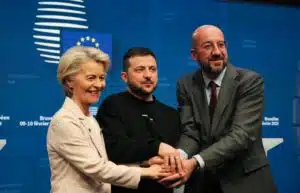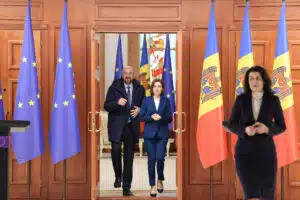Brussels – It was a decisive European Council for Bosnia and Herzegovina, but also two other countries on the road to EU membership. The heads of state and government of the 27 EU member countries looked favorably on the progress made by Ukraine and Moldova “in advancing the reforms necessary for their path to the EU” and now take the formal step: the vote in the Council of the European Union on the start of accession negotiations and the adoption of the negotiating frameworks ahead of the first intergovernmental conference with the two EU candidate countries.

After the December 2023 historical endorsement from the European Council on the green light for accession negotiations for Ukraine and Moldova, it was the summit of EU leaders underway in Brussels that put on paper the call for the 27 European Affairs ministers to “swiftly adopt” draft negotiating frameworks and “take work forward without delay,” according to the conclusions from the European Council. The final step is for the rotating presidency of the EU Council to put on the agenda of one of the next General Affairs Councils the appropriate item, which must be approved unanimously. Only then will the EU accession negotiations for the two candidate countries actually be launched formally, which is why there are already fears in Brussels about another Hungarian veto to the Kyiv dossier. As the President of the European Council, Charles Michel, confessed, the hope is to “arrive at the first intergovernmental conference under the Belgian presidency.” That is, by June 31, the last possible day before the very handover to Viktor Orbán’s Hungary at the six-month leadership of the EU institution.

From left: European Council President Charles Michel and Moldova’s President Maia Sandu
“EU enlargement represents the best investment for a stronger and more united Europe,” Moldova’s president, Maia Sandu strongly emphasized, commenting with a post on X the EU leaders’ decision. “Ukraine is fulfilling its internal transformation commitments. We know that the EU has a negotiating framework ready for your consideration. Its approval could greatly support our people and send the right signal to all of Europe after the European Parliament elections in June.,” Ukraine’s president, Volodymyr Zelensky, said yesterday afternoon (March 21) in a videoconference at the European Council. More cautious among the 27 EU heads of state and government about Georgia, which would like to be “the candidate most ready for EU membership in 2030.” The EU Council “takes note of the ongoing efforts and encourages the country to progress on the outstanding priority reforms.” No step forward from the candidate status granted in December, the recommendation on the start of accession negotiations can still wait.
How the EU accession process works
 The EU enlargement process begins with a non-EU state submitting a formal application for membership to the rotating presidency of the Council of the European Union. Union membership first requires a successfully achieving the Copenhagen criteria (established at the European Council in the Danish capital in 1993 and strengthened by the EU leaders’ meeting in Madrid two years later). These criteria are divided into three groups of basic requests that the Union addresses to the country that has applied for membership: the rule of law and democratic institutions (including respect for human rights and the protection of minorities), stable market economy (ability to cope with market forces and competitive pressure), and fulfillment of its obligations (effectively implementing the body of EU law and meeting the objectives of the political, economic and monetary union).
The EU enlargement process begins with a non-EU state submitting a formal application for membership to the rotating presidency of the Council of the European Union. Union membership first requires a successfully achieving the Copenhagen criteria (established at the European Council in the Danish capital in 1993 and strengthened by the EU leaders’ meeting in Madrid two years later). These criteria are divided into three groups of basic requests that the Union addresses to the country that has applied for membership: the rule of law and democratic institutions (including respect for human rights and the protection of minorities), stable market economy (ability to cope with market forces and competitive pressure), and fulfillment of its obligations (effectively implementing the body of EU law and meeting the objectives of the political, economic and monetary union).
Having obtained the positive opinion from the Commission, the country receives candidate status with the approval of all members of the Union. This is followed by the Commission’s recommendation to the EU Council to open negotiations, which, again, requires the unanimous go-ahead of the member countries: this allows to open the negotiating chapters (varying in number) to prepare the candidate for the implementation of the necessary judicial, administrative, and economic reforms. When the negotiations are completed, and EU enlargement is possible in terms of absorption capacity, there is the signing of the Accession Treaty (with terms and conditions for accession, including any safeguard clauses and transitional provisions), which must first be approved unanimously by the European Parliament and the Council.
Ukraine, Moldova and 8 others. Where does EU enlargement stand
The upheaval in EU enlargement began four days after the Russian armed aggression when, in the midst of the war, Ukraine applied for “immediate” membership in the Union, with the application signed on February 28, 2022, by President Zelensky. Demonstrating the irreversibility of a process of rapprochement with Brussels as an explicit reaction to the risk of seeing its independence erased by Moscow, three days later (March 3), Georgia and Moldova also followed. The European Council of June 23, 2022, approved the line drawn by the Commission in its recommendation: Kyiv and Chișinău became the sixth and seventh candidates for EU membership, while Tbilisi was recognized as having a European perspective in the EU enlargement process. In the EU Enlargement Package 2023, the Commission recommended that the Council open accession negotiations with Ukraine and Moldova and grant Georgia candidate status. All requests were accepted from the December EU leaders’ summit, and now only the formal start of negotiations and adoption of the negotiating frameworks is missing. 
Of the six Western Balkan countries that began the long road to EU membership, four began accession negotiations -Albania, North Macedonia, Montenegro, and Serbia – one has received candidate status -Bosnia and Herzegovina – and the last has formally applied for and is awaiting the response of the 27 Member States – Kosovo. Albania and North Macedonia began negotiations in July 2023 after waiting eight and 17 years, respectively, while Montenegro and Serbia have been at this stage for 12 and 10 years, respectively. After applying for EU membership six years ago, Bosnia and Herzegovina became a candidate to join the Union on December 15, 2022, and yesterday, the European Council gave the green light to begin accession negotiations formally. Kosovo is in the most complicated position since the formal request sent in late 2022: since its unilateral declaration of independence from Belgrade in 2008, five EU member states – Cyprus, Greece, Romania, Spain, and Slovakia – continue not to recognize it as a sovereign state.
Negotiations for Turkey‘s accession to the European Union, began in 2005 but have been on ice since 2018 due to backward steps on democracy, the rule of law, fundamental rights, and the independence of the judiciary. The chapter on Turkey in the latest annual Enlargement Package presented in October 2022 states that it “does not reverse course and continues to move away from EU positions on the rule of law, increasing tensions over border respect in the Eastern Mediterranean.” At the NATO summit in Vilnius at the end of June, the Turkish President, Recep Tayyip Erdoğan,tried to force his hand and threatened to bind Sweden’s membership in the Atlantic Alliance to Brussels opening Turkey’s path back to the EU. The blackmail failed but a special meeting in Brussels addressed the dossier on Ankara in a strategic report.
Find more insights on the Balkan region in the BarBalkan newsletter hosted by Eunews
English version by the Translation Service of Withub








